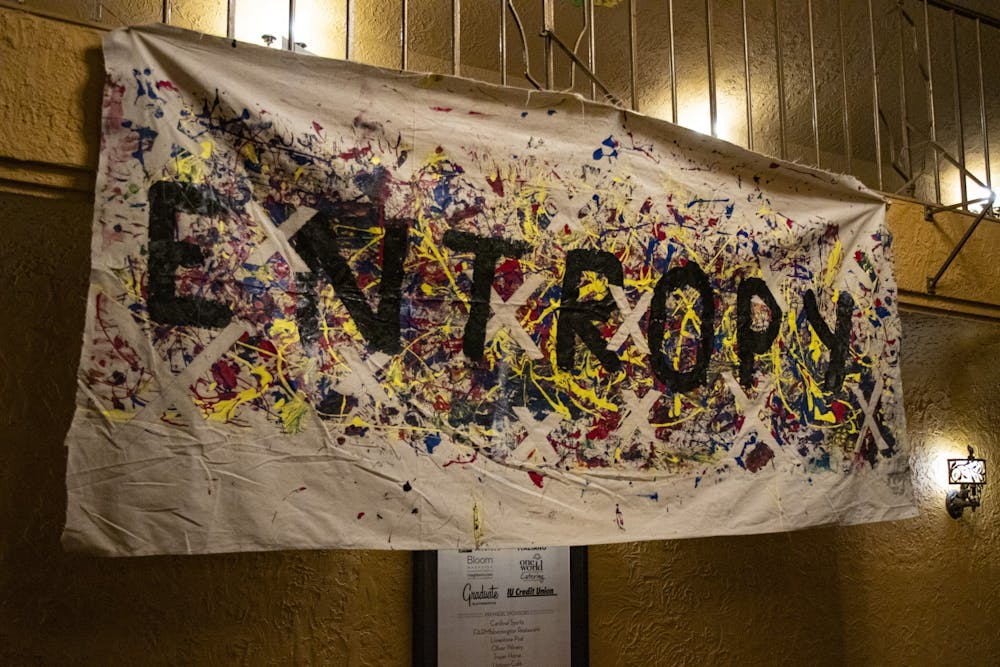Local and global leaders tried to make sense of why things fall apart while speaking to an audience of more than 600 people Friday night at the Buskirk-Chumley Theater.
The speakers were part of IU’s fifth annual TEDx event. This year’s theme was “Entropy,” or the tendency for chaos or malfunction to occur despite all efforts.
The event began with Terri Francis, director of the IU Black Film Center/Archive. She said she has learned through life people aren’t born with a race, they’re born into one.
Francis spoke about a time when she was jogging and a snarling dog chased her. She said the trauma of the memory caused her to suppress most of it. The first thing she remembers is a sheriff informing her the owner of the dog sent it to attack her on purpose.
“It makes you suddenly aware that who you are and who other people think you are is so different,” Francis said.
Following Francis was Jocelyn Lehrer, director and founder of Men’s Story Project, local groups of men who share meaningful stories about their lives to audiences across the world.
She opened her speech by asking who is allowed to like butterflies.
“I saw a 3-year-old boy once say to his mother, ‘Look at the butterflies,’” Lehrer said. “The mother scolded him, saying ‘Little boys don’t like butterflies.’”
Lehrer said she began Men’s Story Project to address harmful notions like these of what it’s like to be a man.
Fred Cate, an IU law professor specializing in information security and privacy law, said the event’s entropy theme inspired him to speak about the sharing of personal data online by third parties.
Cate said it’s not fair users are not more informed about where their information is going when they send it. Companies should take more steps to make terms and conditions of products easier to read and explain to users where their data is going, he said.
“If you give me your credit card, you would expect me to tell you how I’m going to use it,” Cate said.
Sophomore Adam Warner, TEDxIU director of finance, said he was surprised by how much Cate’s speech resonated with him. He said it was short, well-done and powerful.
“I didn’t think a speech about data would be very interesting,” Warner said. “He changed my mind.”
During a short intermission, audience members were encouraged to contribute to a puzzle piece exhibit on the wall and to mingle with one another. Senior Zander Roeschen, TEDxIU marketing director, said the puzzle activity was one of many ways the TEDxIU team pushed to get the audience more involved with the lectures and each other.
“The TED slogan is ‘ideas worth spreading,’ and we wanted to give people space to do that,” Roeschen said.
He said unlike a football game or theatrical show, TEDxIU is meant to be an opportunity to make connections. It’s also about learning and growing, which he said is why the TEDxIU team left a crossword about the speakers and a notebook for note-taking in gift bags on the audiences’ seats.
Following intermission, Brian Collins, chief creative officer at Collins independent experience design company, opened his speech by asking everyone to raise their hand if they enjoyed drawing in kindergarten. He listed every year in school, asking the audience to keep their hands up if they still enjoyed art, until just a few remained.
“That’s entropy in action,” Collins said.
Collins then asked the crowd to draw the person beside them on their notepads upside-down and with their nondominant hand.
He spoke about the human desire for enchantment and how it leads him in his creative work in design. He interacted with the audience throughout the speech, throwing chocolate kisses and stuffed bears to the crowd.
Jeannine Bell, a professor at IU Maurer School of Law, discussed her work in the police field understanding racial crimes and how they are handled.
She gave the audience four tactics for dealing with racism, including saying something when there’s a hateful post online.
“If we’re not addressing the racial injustice we see, we’re making it worse,” Bell said.
Gavin Thurston, who filmed nature documentaries for Animal Planet and BBC, said he sees entropy in the way humans block their senses out in day-to-day life.
He said he discovered this while in Africa, where everyday noise and pollution was much less present.
“When did you last look at the stars and the moon from the city?” Thurston asked. “I think nowadays in the city, it’s impossible.”
Miles Cooley, a lawyer whose clients include Rihanna, Jay-Z and the Los Angeles Chargers, also spoke at the event. Cooley talked about the chaos of being born to teenagers and losing his mother when he was 5 to a drug overdose.
He said he looked at himself not as a victim but someone who was empowered by his circumstances.
“I tell children in similar situations that this is just part of their origin story, and someday, they’ll get superpowers from it,” Cooley said.
Sophomore Rhea Benson said Cooley inspired her the most. She said she enjoyed a quote by Viktor E. Frankl from Cooley’s speech: “Between stimulus and response, there is a space. In that space is our power to choose our response. In our response lies our growth and our freedom.”
She said it’s the advice she needed in the midst of a busy semester.
“It just reminds me that there are so many things you can’t control, but you can change how life affects you,” Benson said.
CORRECTION: A previous version of this story misidentified what the Men's Story Project is. The IDS regrets this error.




